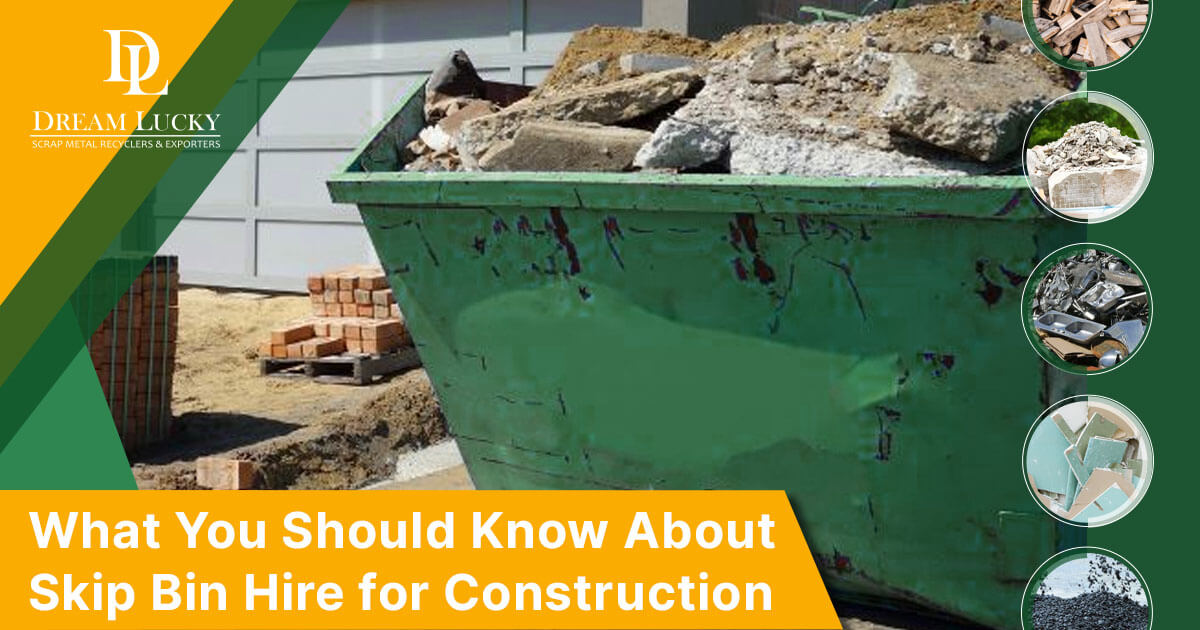
Managing waste during construction projects is essential to keep worksites safe, tidy, and compliant with Australian laws. Construction sites generate various types of waste, from timber and concrete to hazardous materials like asbestos.
Hiring a skip bin is a straightforward and effective way to handle this waste responsibly. Here’s what you need to know about hiring skip bins for construction projects in Australia.
Why Are Skip Bins Important for Construction?
Skip bins make construction waste disposal easier, safer, and more environmentally friendly. They come in various sizes and can hold a wide range of materials, helping builders and contractors stay on top of waste management.
Benefits of Using Skip Bins
- Convenience
Skip bins save you the hassle of multiple trips to the tip. Waste is collected directly from your site. - Waste Segregation
You can choose different bins for different materials, like concrete, soil, or green waste, making recycling easier. - Compliance
Using a skip bin ensures your waste is taken to authorised facilities, meeting environmental regulations like those outlined in the Protection of the Environment Operations Act 1997. - Cost-Effective
With one-off or ongoing hire options, skip bins are a flexible and affordable solution for managing construction waste.
How to Choose the Right Skip Bin
Not all skip bins are the same, and selecting the right one depends on your project’s size and the type of waste you’re producing. Here are a few tips:
1. Understand Your Waste Types
Construction waste can include:
- Heavy Materials:
- Concrete
- Bricks
- Soil
- General Waste:
- Plastics
- Timber
- Metal
- Hazardous Waste
Materials like asbestos must be handled separately by licensed professionals.
Make sure to separate recyclable materials, as this reduces costs and helps the environment.
2. Pick the Right Size
Skip bins come in various sizes, typically ranging from 2 cubic metres to 30 cubic metres. For small renovations, a mini skip might suffice.
For larger projects, like home builds or demolitions, larger bins are more practical. Hiring a bin that’s too small can lead to extra costs, so it’s better to go slightly larger if unsure.
3. Follow Disposal Rules
Only place permitted materials in your skip bin. For example, most companies won’t accept chemicals, batteries, or food waste in construction bins.
Always check with your provider about what can and can’t go in the bin.
How to Make the Most of Your Skip Bin Hire
Hiring a skip bin isn’t just about getting rid of rubbish. It’s also an opportunity to reduce waste, recycle materials, and contribute to sustainability.
Here’s how:
1. Sort Your Waste On-Site
Separating materials like metal, timber, and concrete on-site ensures they are recycled efficiently. This simple step can reduce the amount of waste going to landfills and lower your overall disposal costs.
2. Plan for Pickup and Drop-Off
Coordinate with your skip bin provider to schedule timely pickups and replacements. This keeps your site clear of clutter and ensures you have enough space to continue working efficiently.
3. Monitor Waste Management
Keep track of what goes into your skip bins. This helps you stay compliant with local council requirements, including submitting waste management plans for larger projects.
The Environmental Impact
Construction and demolition waste makes up around 38% of Australia’s total waste, generating about 29 million tonnes annually. While 76% of this waste is recycled, the rest often ends up in landfills.
By using skip bins effectively and recycling where possible, builders can reduce their environmental footprint and promote sustainability.
Hiring a Skip Bin: What to Look For
When choosing a skip bin provider, consider the following:
- Local Experience: Providers familiar with your area will know the local disposal regulations and recycling facilities.
- Transparent Pricing: Look for companies that offer upfront costs with no hidden fees.
- Flexible Options: Ensure the provider offers bins in the sizes you need, along with flexible hire periods.
- Recycling Commitment: Choose a provider dedicated to sorting and recycling your waste to reduce landfill impact.
Hiring a skip bin for your construction project is an easy way to manage waste responsibly, save time, and meet legal requirements. If you have metal waste to dispose of, contact Dream Lucky for scrap metal near Perth to ensure it’s recycled properly while keeping your site clean and efficient.
For larger items like scrap metal, consider searching for scrap metal near me, a convenient option for disposing of and recycling metal waste during home renovations or major building projects.
Omer Bekhit
The dedicated owner and operator of Dream Lucky Scrap Metal. He has been at the forefront of ethical scrap metal recycling, exporting, and dealing. With a hands-on approach to the business, Omer ensures that every transaction is conducted with transparency and sustainability in mind.